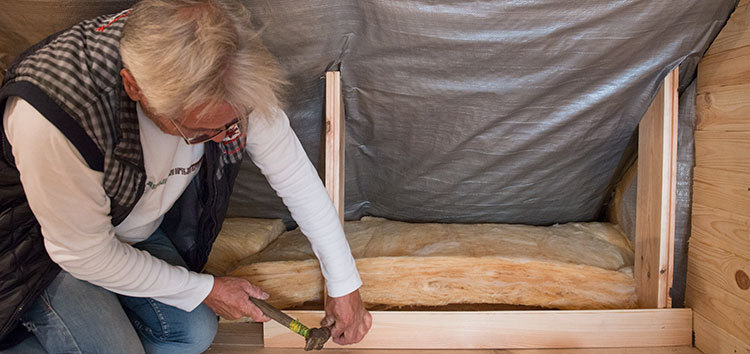Featured Galleries USUBC COLLECTION OF OVER 160 UKRAINE HISTORIC NEWS PHOTOGRAPHS 1918-1997
 Holodomor Posters
Holodomor Posters

Promoting energy efficiency in Ukraine’s residential sector
 By Lucia Sconosciuto for EBRD, Kyiv, Ukraine,
By Lucia Sconosciuto for EBRD, Kyiv, Ukraine,
Tue, Nov, 15, 2016
EBRD-designed credit line helps homeowners save energy and live more comfortably
This last summer was a special one for Aleksandre Dragomiretsky and his wife. For the first time, their grandchildren spent the entire season with them, in their home on the outskirts of Ukraine’s capital, Kiev.
Until recently, this beautiful house on the banks of the River Dnieper was Mr Dragomiretsky’s dacha, a weekend residence. It was only when the couple moved in permanently, a few years ago, that they realised how cold the winters and hot the summers there could be.
“Our guest bedrooms under the roof suffered from the property’s inadequate insulation,” Mr Dragomiretsky said. “During summer holidays, we could only have our grandchildren for short visits. The bedrooms were simply too hot.”
But in spring Mr Dragomiretsky made up his mind: it was time to invest in improving his house’s insulation.

For this project, he took a loan through the IQ energy programme, designed by the European Bank for Reconstruction and Development (EBRD), which helped him select the best energy efficient material to insulate his roof and even obtain an incentive repayment after the improvement works were completed and audited.
This energy efficiency financing programme targets Ukraine’s residential sector, responsible for over a third of all the country’s energy consumption. With over 10 million buildings, many of which were built in the Soviet era with poor energy performance, the potential to make Ukrainian homes more comfortable and cutting energy bills is huge.
Reducing greenhouse gas emissions and boosting climate finance through the private sector are at the core of the EBRD’s Green Economy Transition approach. They are also part of the global strategy to keep temperatures worldwide from rising more than two degrees.
Programmes such as IQ energy show what the EBRD can do to help countries where it invests implement the Paris climate agreements, something the EBRD is discussing at COP 22 in Marrakesh this week.
The IQ energy loans and grants, currently offered through three local banks, are awarded for the purchase of specific energy-efficient technologies which provide high energy savings. Incentive payments can reimburse individual borrowers between 15 - 20 per cent of the investment and up to €3,000.
Housing Associations can be reimbursed up to 35 per cent of their investments. The list of eligible state of the art products includes double or triple-glazed windows, front doors, insulating material for walls, floors and roofs, gas and biomass boilers, heating systems, heat meters and solar heaters.
To help homeowners such as Mr Dragomiretsky and housing associations understand the long-term benefits of investing in energy efficient solutions and curbing energy costs, the programme includes awareness campaigns as well as incentive payments for successfully completed projects.
The programme is supported by the Eastern Europe Energy Efficiency and Environment Partnership (E5P)* with €15 million for investment grants. IQ energy also benefits from technical assistance provided by the E5P Fund and Sweden. It helps EBRD’s partner financial institutions structure and market financially feasible and attractive loan products to support green investments.
The programme also helps borrowers make informed choices and invest in best solutions via media campaigns and a website offering information, tools and advice.
IQ energy presents several innovative features including a web-based interactive catalogue of highly energy-efficient technologies and materials available in the Ukrainian market.
The website describes technical features and energy savings for each item so that potential buyers can compare and select the appropriate equipment.
“I built this house with my own hands and I was able to install the insulating material myself,” said Mr Dragomiretsky. “In just two weeks the works were done and the grandchildren moved in for the summer.
“They have enjoyed the slow rural life of the village, chased dragonflies long the river bank and ate lots of grandma’s delicious homemade borshch,” he added.
He spread the word to his friends and now they are planning further works for next season using the IQ energy loans. Meanwhile, he’s looking forward to his first ever cosy winter at home.
“IQ energy is based on the well-established Sustainable Energy Financing Facilities model of the EBRD which has been implemented in 24 countries, through over 100 local banks,” explained Yucel Inan, EBRD Energy Efficiency and Climate Change.
“By combining different information channels, technical assistance and investment grants, we intend to spread a culture of energy efficiency and help Ukraine cut back on residential energy consumption.”
The EBRD plays a key role in promoting green financing in the regions where it invests. Since 2006, the Bank has invested over €20 billion in some 1,160 green energy projects totalling more than €112 billion. Under its Green Economy Transition approach, the Bank aims to double the pace of its climate financing by 2020.
*The E5P fund is supported by the European Union (the largest contributor), Armenia, Czech Republic, Denmark, Estonia, Finland, Georgia, Germany, Iceland, Ireland, Latvia, Lithuania, Moldova, Norway, Poland, Romania, Slovak Republic, Sweden, Ukraine and the United States.
LINK: http://www.ebrd.com/news/2016/promoting-energy-efficiency-in-ukraines-residential-sector.html











